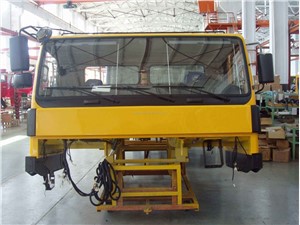Understanding Fuel Tanker Truck Capacity: A Comprehensive Guide

Introduction
Fuel tanker trucks are vital for the transportation of fuels such as gasoline, diesel, and other petroleum products. Their capacity directly impacts logistics, operational efficiency, and cost-effectiveness in the fuel distribution industry. Knowing the fuel tanker truck capacity is crucial for businesses that rely on timely fuel delivery and optimal transportation costs. This article explores various aspects of fuel tanker truck capacity, including types, considerations in choosing the right tanker, regulations, and practical examples.
What is Fuel Tanker Truck Capacity?
Fuel tanker truck capacity refers to the volume of fuel that a tanker can carry. This capacity is typically measured in gallons or liters and can vary significantly based on the truck’s design and purpose. Understanding the capacity helps companies plan fuel delivery schedules efficiently and manage operating costs.
Factors Influencing Fuel Tanker Truck Capacity
Several factors can influence the capacity of fuel tanker trucks, including:
- Design of the Tanker: Different designs, such as standard, oval, or round shapes, affect the volume.
- Type of Fuel: The density of the fuel type can also play a role in determining effective capacity.
- Weight Limitations: Regulatory weight limits imposed by transportation authorities can restrict how much fuel can be loaded into a tanker.
Types of Fuel Tanker Trucks
1. Truckload Tankers
Truckload tankers are designed for large volumes and can typically carry anywhere from 5,000 to 11,600 gallons (approximately 19,000 to 44,000 liters) depending on design and regulations.
2. Bulk Tankers
Bulk tankers are used for transporting a variety of fuels and are primarily seen in larger operations. Their capacities can range from 6,000 to 10,000 gallons (around 22,700 to 38,000 liters).
3. Specialized Tankers
These tankers are designed for specific types of fuel, such as LPG (Liquefied Petroleum Gas) or chemicals. Their capacities vary widely based on the fuel being carried, usually between 1,000 and 5,000 gallons (about 3,800 to 19,000 liters).
4. Mini Tanker Trucks
Mini tankers are suitable for smaller deliveries and typically have a capacity of around 1,000 to 3,000 gallons (approximately 3,800 to 11,400 liters).
Regulatory Considerations for Fuel Tanker Capacity
Compliance with DOT Regulations
The U.S. Department of Transportation (DOT) has strict regulations that govern the maximum capacity for fuel tanker trucks. These regulations ensure safety during transport and can impact how companies configure their tanker systems.
State Regulations
Each state may have additional regulations regarding the transport of fuel, impacting how many gallons can be transported without specific permits. It’s essential for transport companies to be well-versed in local laws to avoid penalties.

Choosing the Right Fuel Tanker Truck Capacity
When selecting a fuel tanker truck for your operations, consider the following factors:
- Volume Needs: Assess your fuel delivery volume to determine the appropriate truck capacity.
- Distance of Travel: Longer distances may necessitate larger tankers to maximize efficiency.
- Loading and Unloading Efficiency: Consider how quickly the fuel can be transferred at delivery sites.
Practical Examples of Tanker Capacity Use
| Fuel Type | Typical Tanker Size (Gallons) | Usage Example |
|---|---|---|
| Diesel | 9,000 | Delivered to construction sites. |
| Gasoline | 10,500 | Supplied to retail gas stations. |
| LPG | 4,500 | Used for commercial heating. |
| Chemicals | 2,500 | Delivered to manufacturing plants. |
Cost Implications of Fuel Tanker Capacity
The volume of fuel transported by a tanker directly affects operational costs. Here are some considerations:
Fuel Costs
A larger tanker can carry more fuel per trip, which can lead to lower costs per gallon due to increased efficiency. However, the initial investment in purchasing a larger tanker can be significant.
Insurance Costs
Insurance premiums may vary based on the tanker size and the fuel being transported. Larger capacities can mean higher premiums due to increased risk.
Maintenance Costs

Maintenance costs can also vary. Larger tankers may have higher maintenance needs due to their complex systems, which should be considered when calculating overall operational costs.
Tips for Optimizing Fuel Tanker Truck Capacity
1. Regular Maintenance
Maintain your tanker truck regularly to ensure it operates efficiently and effectively. This includes checking for leaks and ensuring all systems function correctly.
2. Monitor Fuel Dispensation
Use technology to monitor how much fuel is dispensed during deliveries. This data can help you optimize refilling schedules and reduce costs.
3. Invest in Training
Ensure drivers are well-trained in operating fuel tankers safely and efficiently, including optimizing loading and unloading procedures.

Technological Advancements in Fuel Tanker Trucks
Fuel Monitoring Systems
Advanced fuel monitoring systems provide real-time data on fuel levels, which can optimize logistics and prevent shortages during transport.
Telematics
Telematics technology allows companies to track the movement of fuel tankers, leading to better route optimization and reduced operational costs.
Frequently Asked Questions (FAQ)
1. What is the average capacity of a fuel tanker truck?
The average capacity ranges from 5,000 to 10,500 gallons (19,000 to 40,000 liters), depending on the type of tanker and regulations.
2. Can a fuel tanker be overloaded?
Yes, overloading a fuel tanker can violate regulations and create dangerous situations. Always adhere to the specified weight limits.
3. How do I choose the right tanker size for my business?
Consider your fuel delivery needs, distance, and efficiency of loading/unloading processes when selecting tanker size.
4. What regulations affect fuel tanker capacity?
Regulations are set by the DOT and may vary by state, impacting maximum load limits and safety standards.
5. How can I reduce costs associated with fuel transportation?
Optimize routes, invest in regular maintenance, and monitor fuel usage closely to reduce overall costs associated with fuel transportation.
6. Are there specialized tankers for different fuel types?
Yes, specialized tankers are available for different fuel types, including LPG and chemicals, each with unique design and capacity specifications.
